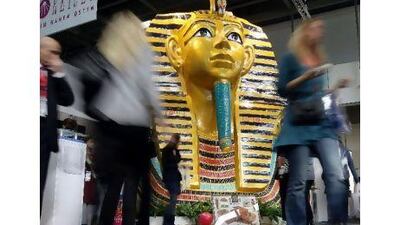Egypt's tourism industry is building the country's turmoil into its marketing as it tries to lure visitors back after the unrest drove holidaymakers away.
Hoteliers, tour operators and government officials from Egypt last week descended on the world's largest travel exhibition in Berlin in force in an effort to recoup the revenue losses suffered in recent weeks. Images of Tahrir Square stood alongside a giant Tutankhamun mask at Egypt's vast stand that occupied an entire hall at the ITB.
"We have another product to sell in addition to the treasures we have like the resorts and classical tours," said Tarek Fouad, the managing director of Emilio Travel, an Egyptian group. "We have a new product, which is our revolution."
Advertisements for Egypt scattered around the entire exhibition depicting sandy beaches, diving and the pyramids, also featured slogans including: "Welcome to the country of the peaceful revolution," and "Revolution - Evolution."
Tourism accounts for 11.5 per cent of Egypt's GDP and creates one in seven jobs both directly and indirectly. Each February Egypt would normally expect to receive up to 1.2 million visitors, who stay an average of nine days and spend US$85 (Dh312) a day. But few tourists visited last month.
Businesses are still suffering following the unrest and few are expecting a swift recovery, but Egyptians hope the events could attract new visitors.
"If tourists go to Cairo, the first thing they'll ask is to go to see Tahrir Square," said Nader Guirguis, the chairman of Angelotel Hotels and Cruises, based in Cairo. "It will be one of the important sights. It will have a statue and tourists will be able to see and read the story of the revolution in Egypt."
Mounir Fakhry Abdel Nour, Egypt's minister of tourism, said: "We think - and I really believe it; it's not a sales pitch that I'm doing - that the sympathy Egypt gained on the international arena will probably allow us to recoup the loss very quickly."
There are also early signs of improvement, with the travel company Intrepid relaunching its tours to Egypt yesterday.
Tunisia is also hoping to attract tourists because of recent events, although its slogan "I love Tunisia, the place to be … now!" seemed slightly controversial.
Tunisia tourism dropped about 40 per cent last month, said Saidi Mohammed of Tunisia's tourism board. "This is the consequence of the revolution. But this is not too bad. For us it's an advertisement."
The summer is Tunisia's peak season and Mr Mohammed is hoping some business can be recovered through these marketing efforts.
"We hope in the summer … we can save the situation. With the German market, the Algerian markets, the European markets we have to do a lot to receive tourists."
Authorities agreed the industries could emerge stronger.
"Egypt and Tunisia are suffering from a setback, but that's only momentarily," said Taleb Rifai, the secretary general of the UN World Tourism Organization. "In the medium and long-term it's going to become even much better than before.
"Tourism may flourish in a political system which is not democratic or transparent, but it won't flourish for too long. It cannot be sustained. Tourism blossoms in more open societies. The energies and innovative natures of people are unlocked."
A recovery would, however, still take time, tourism operators agreed.
"We are selling a very fragile product, which is tourism," said Mr Fouad. "If there is any problem anywhere, tourists will definitely choose another destination.
"So far the effect is very negative. But we are looking forward because the situation will not exist for long like that.
"Definitely after we have the presidential election and we have the government, the tourism industry will be improved. Even we expect the numbers will increase on the old numbers because we have a very healthy environment."

